Imagine you’ve just arrived in Marrakech, Morocco: you’re walking down a narrow cobblestone street dodging wayward roosters, donkey-drawn carts careening down alleyways, and men in long djellabas zipping by on mopeds between red mud buildings draped in mismatched fabric hangings.
You pass hole-in-the-wall bread shops with hand-painted boulangerie signs—a reminder of Morocco’s French colonial past—and little stalls crammed with a rainbow of ceramic tiles and tourist trinkets. As the morning call to prayer floats out of the ornate minaret of a nearby mosque, you emerge from the market, blinking against the harsh sunlight, and spot the jagged outline of towering dunes cutting through the desert haze.
Like many adventure travelers before you, you’re drawn to Morocco for flamboyant bazaars, sunset camel rides, ancient cultures, and to swallow a surprising amount of sand while you’re surfing in the Sahara (or perhaps that last one is just me). But you may also be searching for something a little different—something deeper than the postcard version of the place.
For me, that curiosity was dinosaurs. The idea that the Sahara Desert—a vast swathe of glowing orange dunes and patches of date palms—was once a tropical sea teeming with prehistoric life captivated me, and I was just as excited to see the desert itself as I was to trace its ancient past.
And while I generally prefer to throw myself into a new country with a backpack and a curiously optimistic idea of what I’d like to do, sauntering presumptuously around the world’s largest hot desert without a local guide sounded like the beginning of a missing person newscast where everyone at home folding laundry or scrolling Facebook sighs, “Well, she should have known better.”
That’s why I partnered with Seekers Travel Morocco for a private, luxury 6-day Sahara Desert tour from Marrakech! I’d love to say I braved the desert solo, but nothing beats local expertise. Plus, I prefer my adventures with a side of easily accessible coffee—and ideally indoor plumbing. This was a provided experience, but as always all opinions are entirely my own!
From Marrakech to Merzouga: Highlights
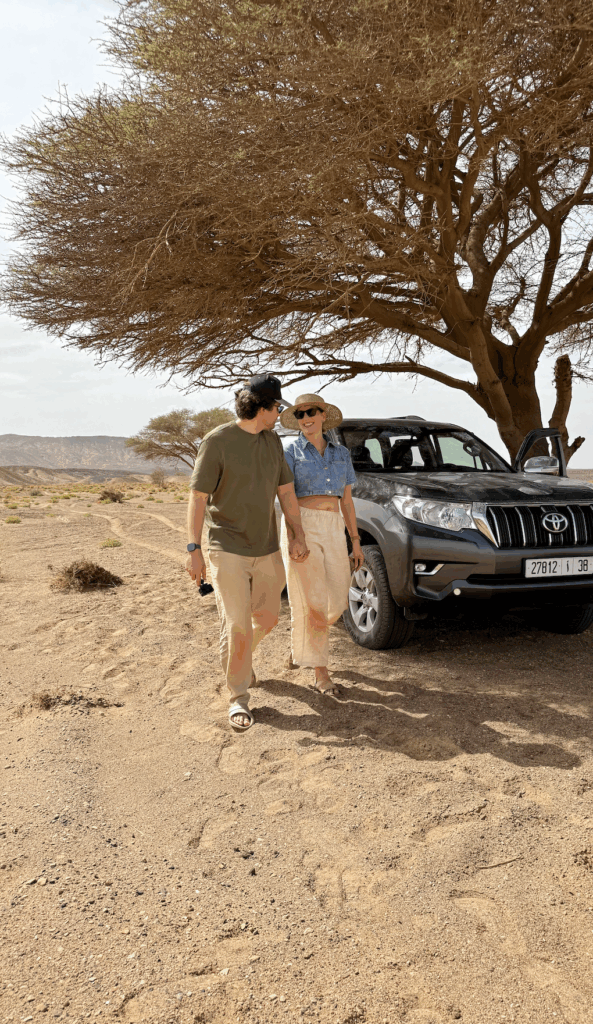
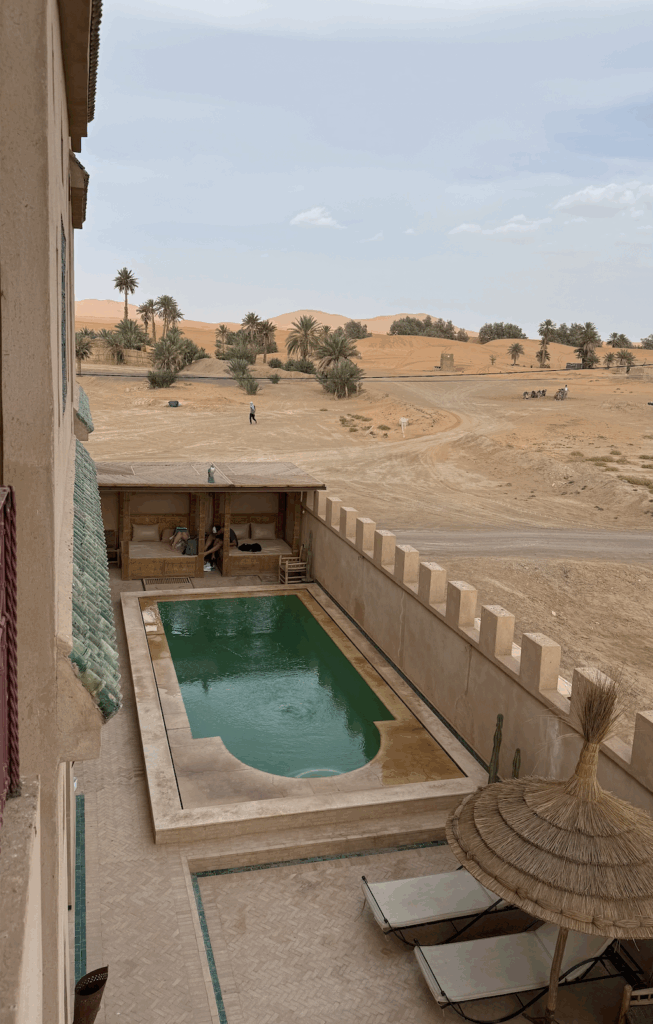
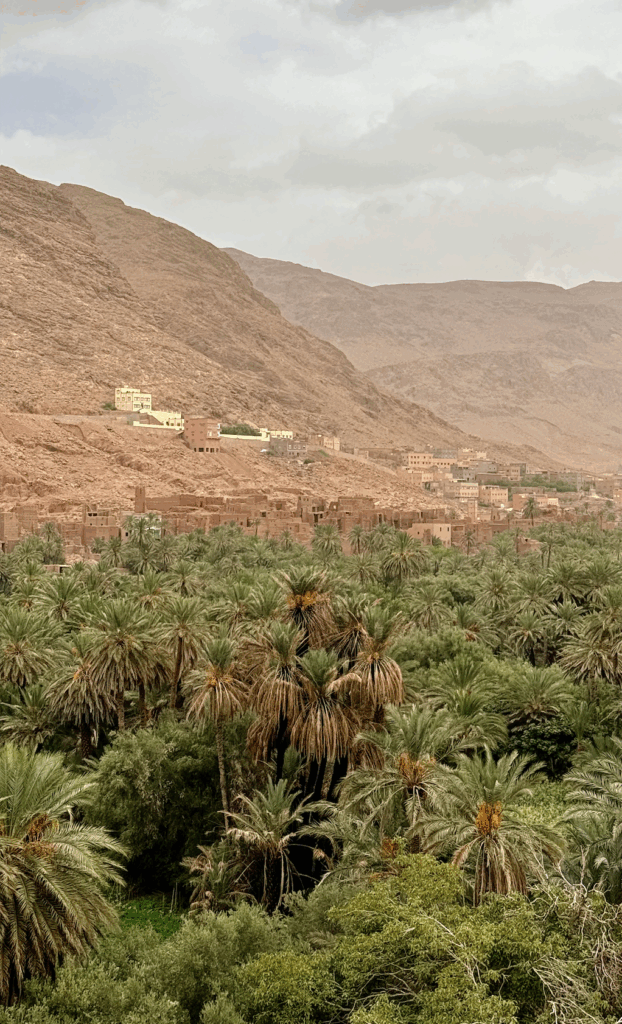
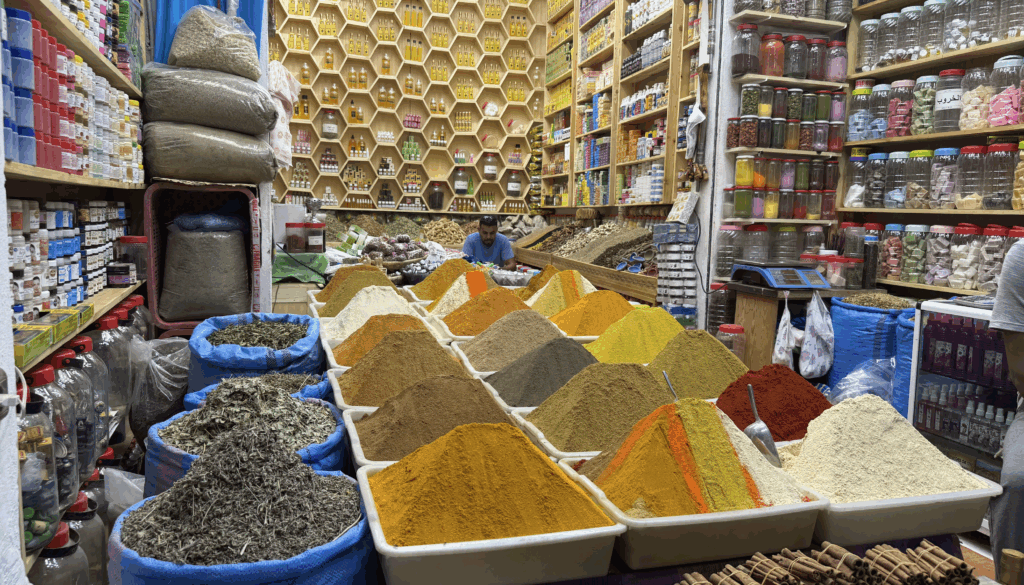
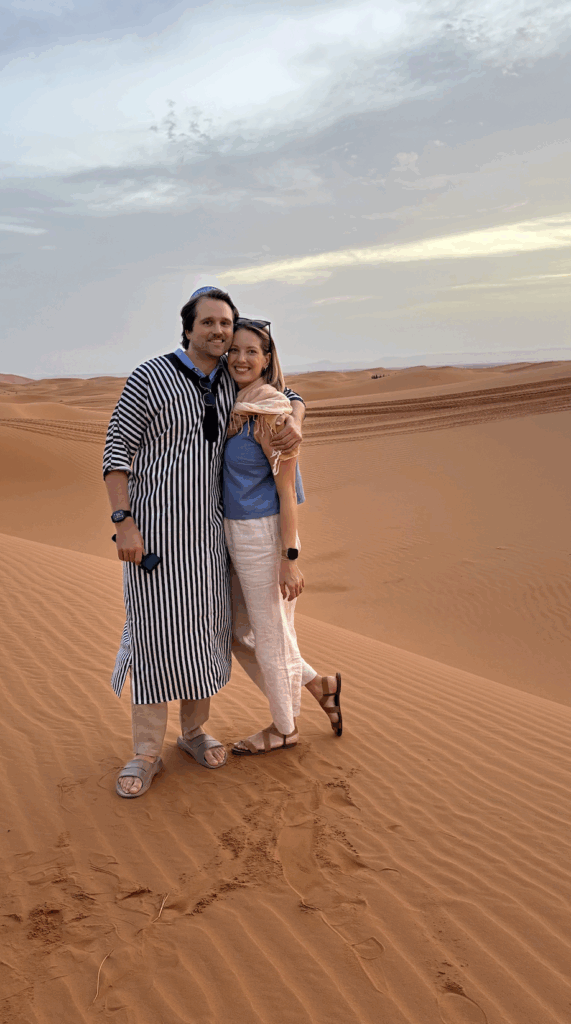

If you’ve ever wondered whether you can pop over to the Sahara Desert from Marrakech for a weekend, know that the desert is far. It’s a 10+ hour journey by car that zigzags through the dramatic Atlas Mountains before you reach Merzouga, the gateway to the Sahara.
Our private guide, Zaid, has been running tours here for over two decades, which was reassuring as we climbed steep switchbacks, navigating herds of goats and motorcyclists, neither of whom seemed to mind driving brazenly on the wrong side of the road.
The luxury Sahara Desert camp experience
By the time we arrived in Merzouga, the red dunes were glowing in the late-afternoon light. Camels rested in the sand, their shadows stretching long and lean across the sand, rippling like waves in a gentle breeze.
We hopped in the back of a Toyota Tacoma driven by Mohammed, a local Amazigh—North Africa’s Indigenous people, who are more widely referred to as Berbers—and stormed over rolling dunes, flowing like massive waves toward our desert camp. Along the way, Mohammed pointed out the Amazigh flag—blue for the Mediterranean, yellow for the Sahara, green for the mountains, and a red symbol in the center for freedom: no religion, no borders.
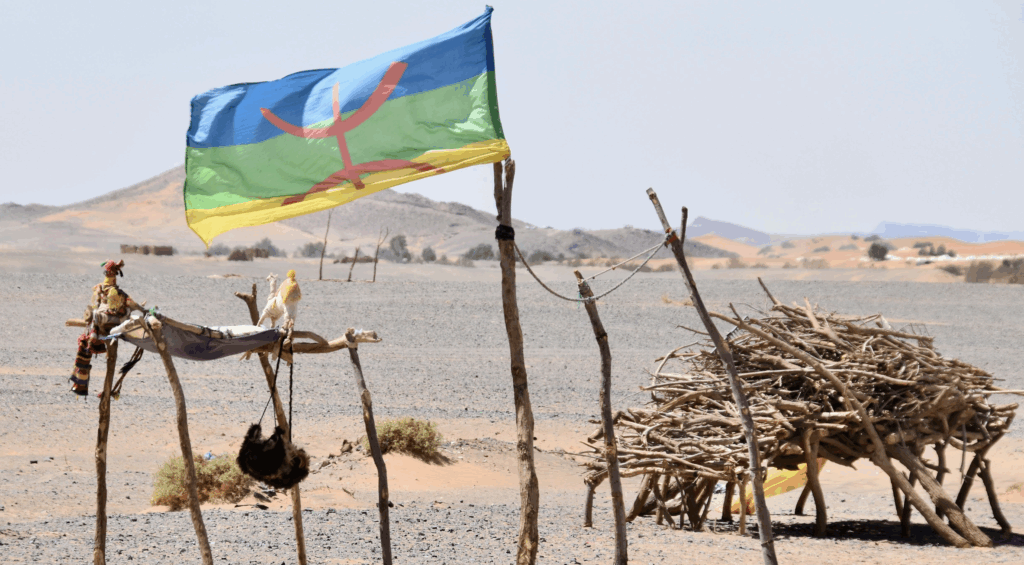
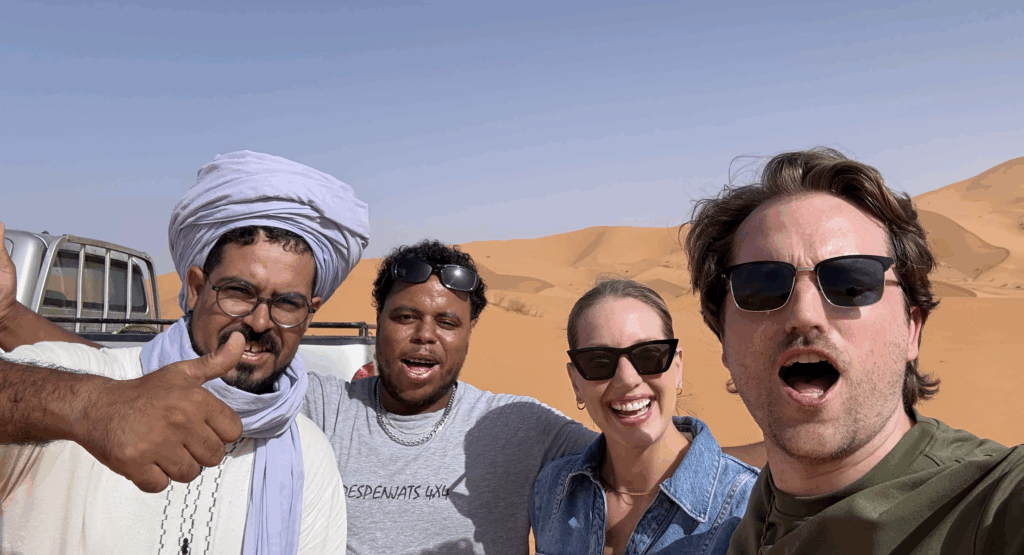
Before this trip, I knew little about the Amazigh, whose culture and language predate written history depending on who you ask. Many still live semi-nomadically in Morocco, Algeria, Mali, and beyond, moving seasonally with their camels and livestock in search of fertile grazing and water.
At the camp, La Sultana, we traded shoes for sand, watched the sunset from camelback, and ate locally-sourced bubbling eggplant tagine, creamy tomatoes smothered in cheese, grilled chicken, spiced meatballs, and chocolate cookies topped with crispy pistachios. As the sky turned from inky blue to velvet, a drum circle began behind the tents.
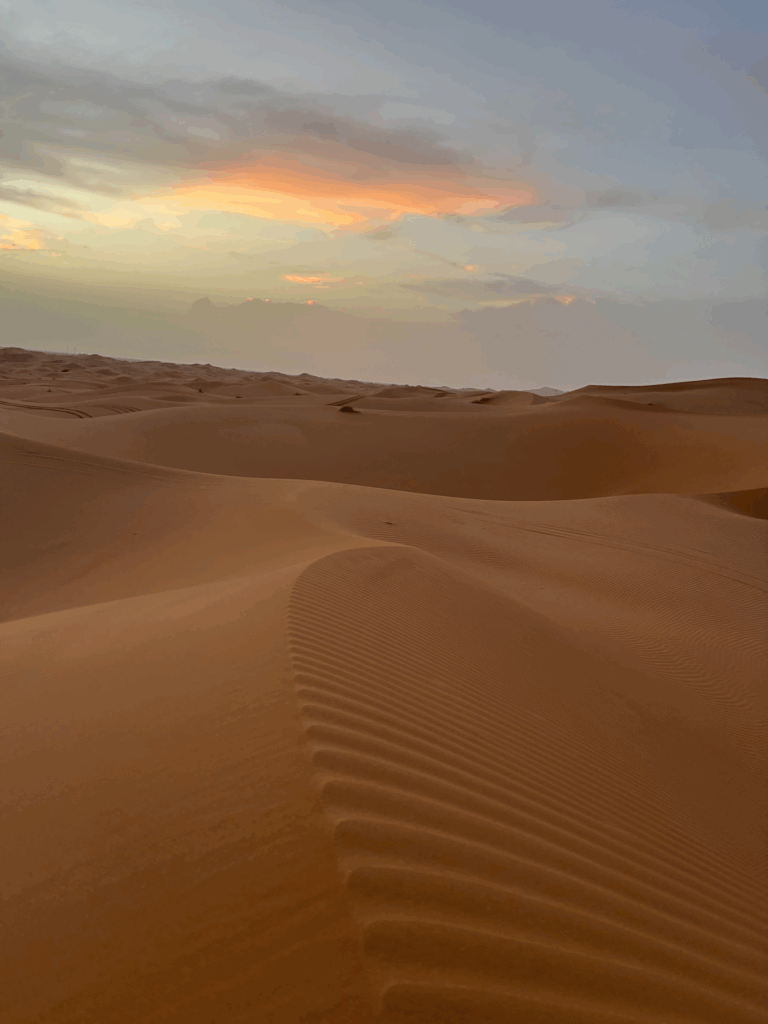
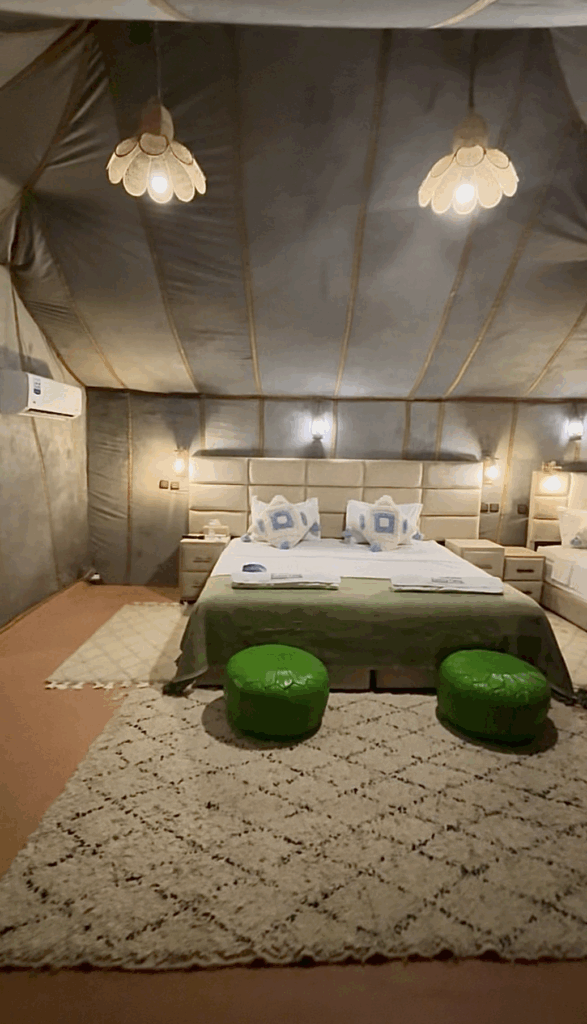
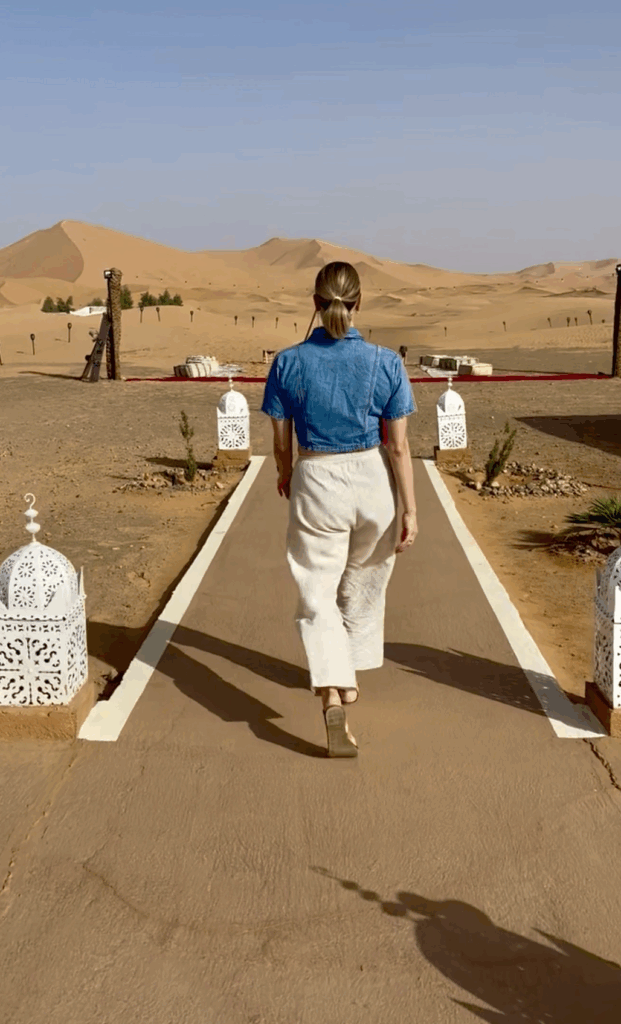
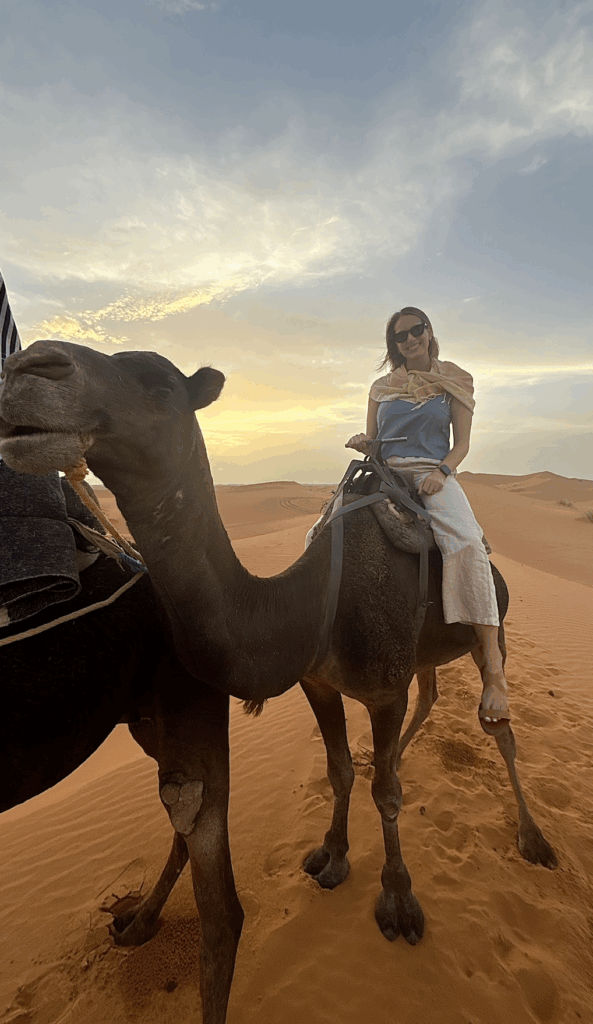
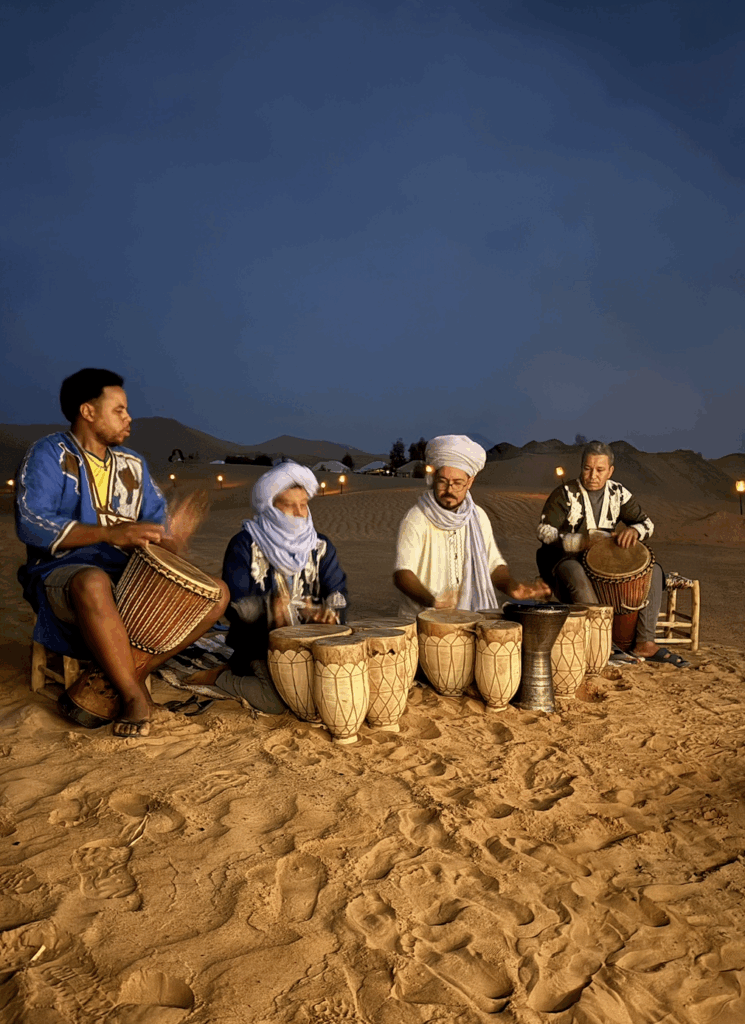
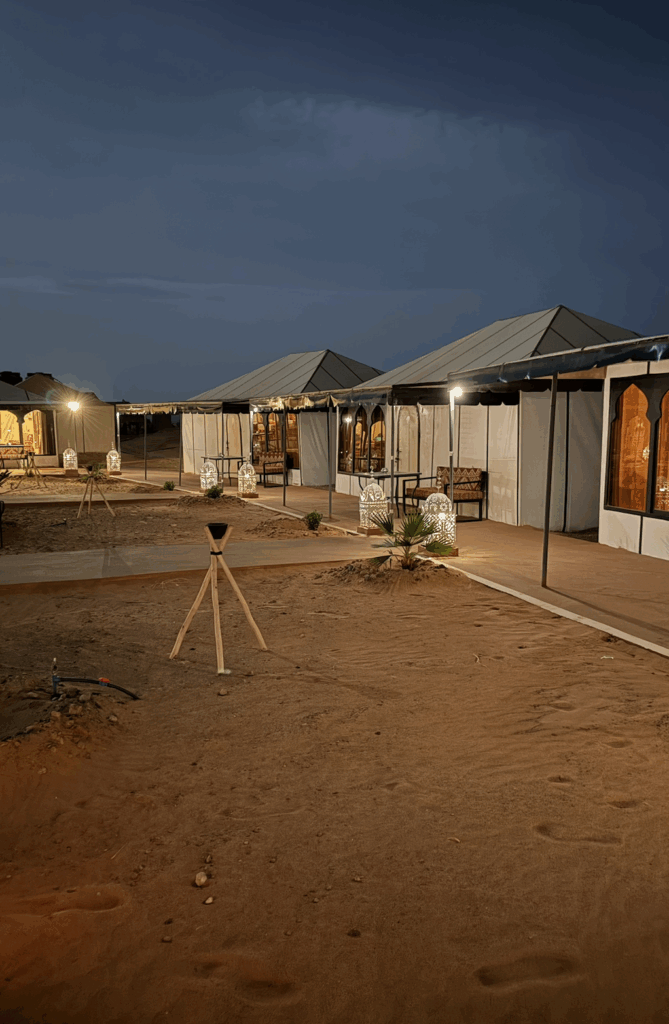

To be honest, normally I’d bail on any “song-and-dance” tourism. You know the scene—a busload of tourists herded into a dusty courtyard where locals in bright costumes perform the same routine they’ve done a hundred times that week. Cameras come out, a smattering of lukewarm applause follows, and within minutes everyone’s back on the bus headed for an all-you-can-eat buffet. It’s hollow.
But this felt different—sitting by the fire swapping stories rowdily into the night, laughter mixing with the crackle of burning wood. We traded bits of our worlds: songs, slang, and the kind of riddles that only make sense after midnight. We taught Mohammed Get Low by Lil Jon (discovering far too late late how impossible it is to skirt over some of the more offensive lyrics), and he lit up talking about his love of Jimi Hendrix and Shakira. Somehow, between “to the window, to the wall” and “Africa,” we ended up talking about rebellion, rhythm, and trying out the drums ourselves. Music is the same story everywhere, just told in different accents.
As I ducked into my tent that night, I could still hear Mohammed softly drumming outside, muttering “to the windows, to the walls…” and I can only hope that the Sahara can recover from that particular cultural exchange.
Fossil hunting in the Kem Kem beds
While most travelers head home after the camel rides, we started the morning with sand surfing (or rather, sand flailing and falling), opting out of some of the more hardcore activities like desert quad biking and dune hiking. Instead, we made the off-road journey to the Kem Kem fossil beds, which are some of the richest Late Cretaceous fossil sites in the world.
Paleontologist Paul Sereno and a team of international scientists—more cowboy bounty hunters of prehistoric predators than dusty museum types—had published a gobsmacking paper in 2014 after finding the most complete skeleton anywhere in the world of the Spinosaurus (a carnivorous dinosaur larger than the T. rex) on Morocco’s eastern border with Algeria. I’d read all about it leading up to the trip, and was dying to see the dig site for myself!
But instead of the neat picture of an excavation I’d created in my head—hard hats, brushes, scientists taking careful notes—I found myself huffing up a sun-baked mountain jutting out of a lonely landscape with a local Amazigh, who I gathered was an artisan fossil hunter. When we reached the top, he handed us headlamps and waved wordlessly (he spoke only Berber, and us only English) toward a dark, 3-foot opening in the mountain.
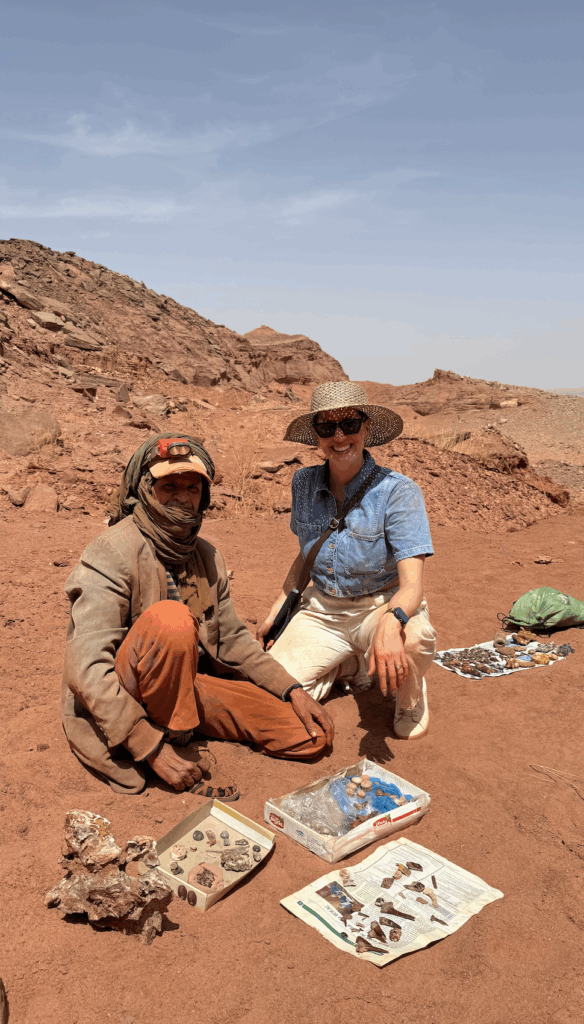
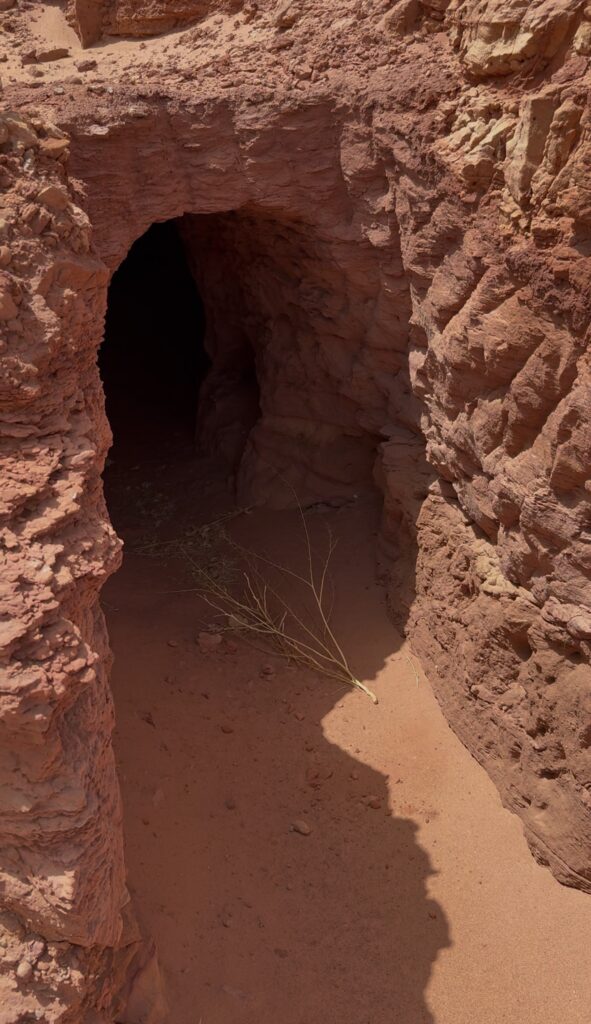
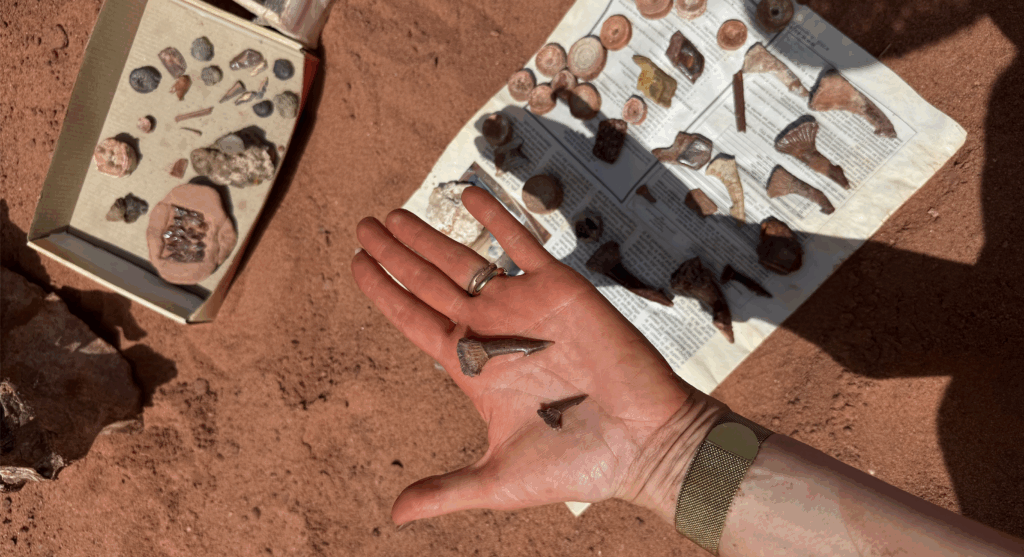
Crawling cautiously after him, we wound silently on our hands and knees through a series of progressively darker tunnels. Just as I started to lose my nerve, he stopped, pulled a small tool from his pocket, and ran his fingers over a rather ordinary looking patch of cave wall like an x-ray before beginning to gently—almost surgically—tap away at one spot in particular.
I watched in awe as he pulled prehistoric teeth, vertebrae, and dino bits from the rock, sweat pouring down my face cementing the red dust to my skin. He continued chiseling away, tossing sand over his shoulder without a glance. Every so often, he’d murmur “Spinosaurus” or “Pristis,” holding out a tooth or bone fragment to show me as casually as someone in suburban Ohio might show you a stamp collection.
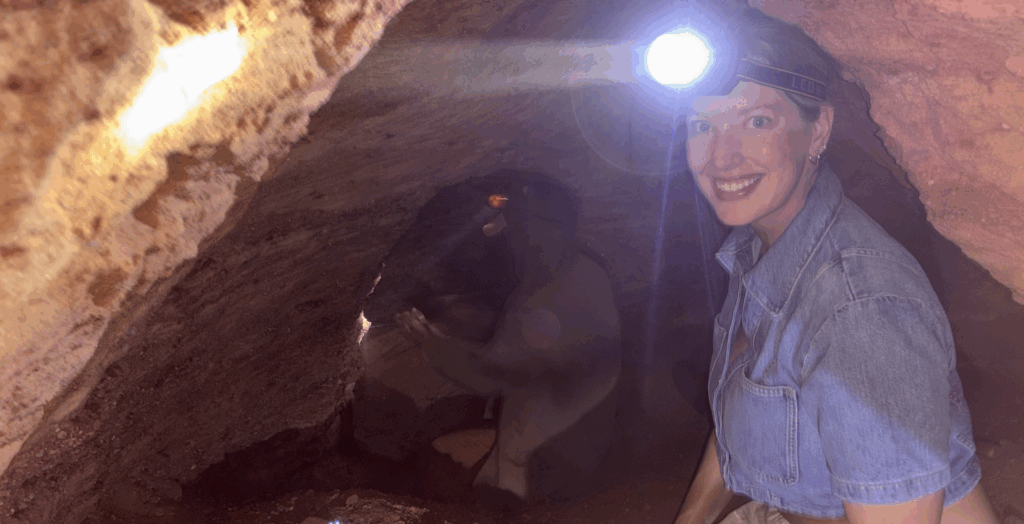
Out of respect for local laws and customs, we didn’t remove anything and simply gawked at 100 million-year-old leftovers, amazed at how the local Amazighs have dug these intricate caves by hand for generations.
It was exhilarating for a dinosaur enthusiast, but this experience isn’t for everyone. With no water and absolutely no hand-holding, I imagine the average person probably would have turned around halfway and sheltered in the air-conditioned Land Cruiser. But if you thrive on a bit of chaos, can rough it, and welcome the unexpected, I can’t imagine a better way to learn about indigenous fossil hunting and the Amazigh’s profound connection to the land.
“Traveling outgrows its motives. It soon proves sufficient in itself. You think you are making a trip, but soon it is making you–or unmaking you.” Nicolas Bouvier, The Way of the World (1963)
That said, if you’re headed to Morocco specifically for fossils and want a hands-on, educational experience, check out the paleontologist-led tours offered in English by Morocco Excursion Guided Fossil Hunting Tours.
6-day itinerary from Marrakech to the Sahara Desert
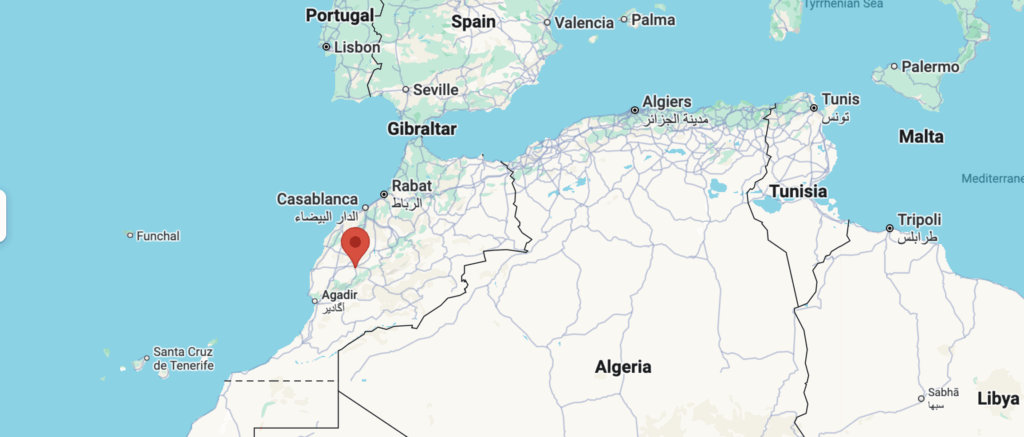
Much to the chagrin of the folks googling “2-day tour from Marrakech to Merzouga,” you can’t just pop over to the Sahara from Marrakech like a quick Target run. The desert is far, and I recommend at least 5 days unless you want your butt permanently fused to a car seat. Anything less is car torture disguised as a vacation.
Google Maps is all but useless here, and the drive time indicated on the map is half of the amount of time it actually takes to get anywhere. Here’s the reality:
- Day 1–2: Wind your way through the Atlas Mountains.
- Day 3: Roll into Merzouga in the late afternoon.
- Day 4–5: Live your desert dreams.
- Day 6: Crawl back to Marrakech in a 10+ hour drive.
Insider tips: How to make the most of your luxury Sahara Desert tour
Learn from me, grasshopper:
- Set detailed expectations and communicate with your guide. If you don’t want to stop at souvenir shops, say so. If you’re not interested in history, say so. Communicate exactly what your interests are—and aren’t. Customization and flexibility are the best perks of a private tour!
- Bring a handheld fan. The desert sun is ruthless, and I carried both a small battery powered fan and a paper fan.
- Pack entertainment. Podcasts, Kindle, existential thoughts—you’ll need something for the long drives.
- Get an e-sim before you leave Marrakech. You’ll want data when you’re nine hours deep into nowhere. My favorite e-sim (which was unfailingly dependable in Morocco even in the most remote places) is Nomad. Not sponsored, just a great e-sim!
Logistics and FAQs: Sahara Desert adventure travel & tours
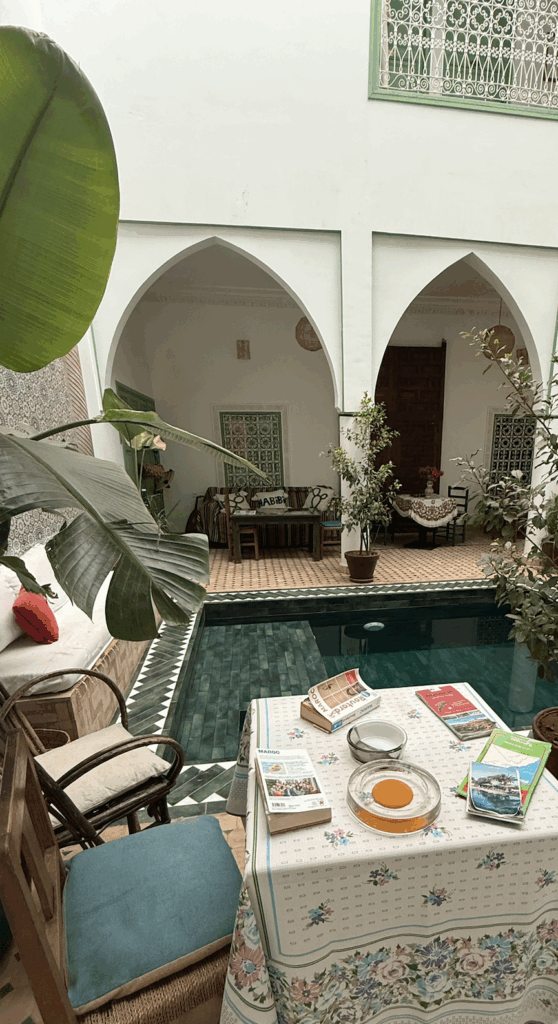
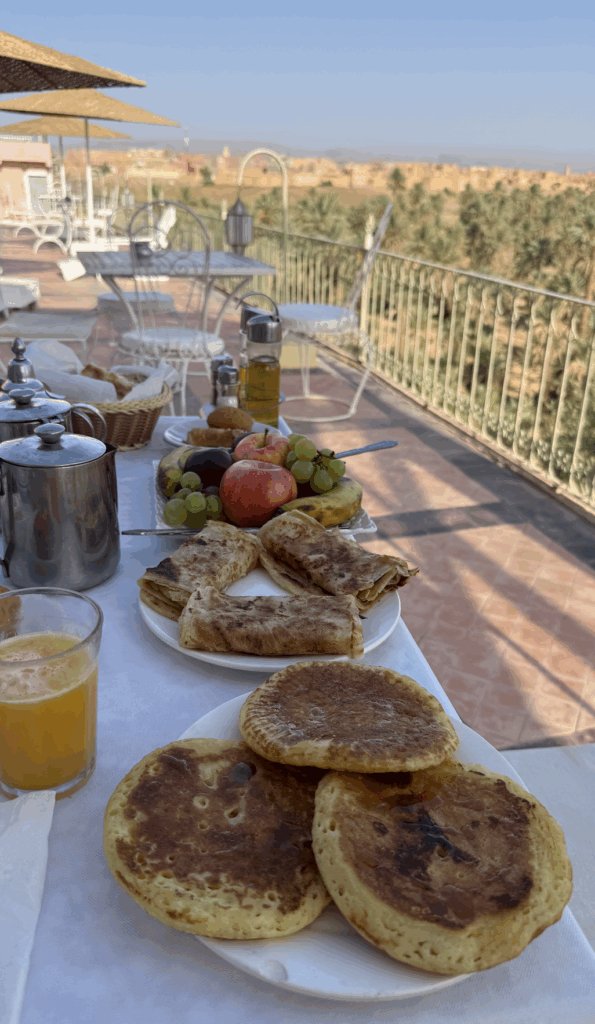
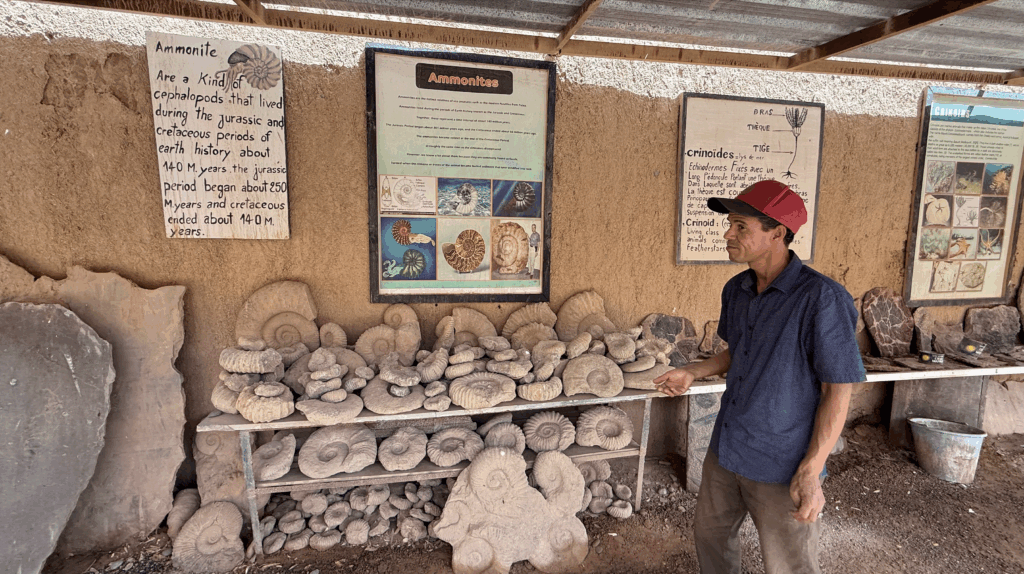
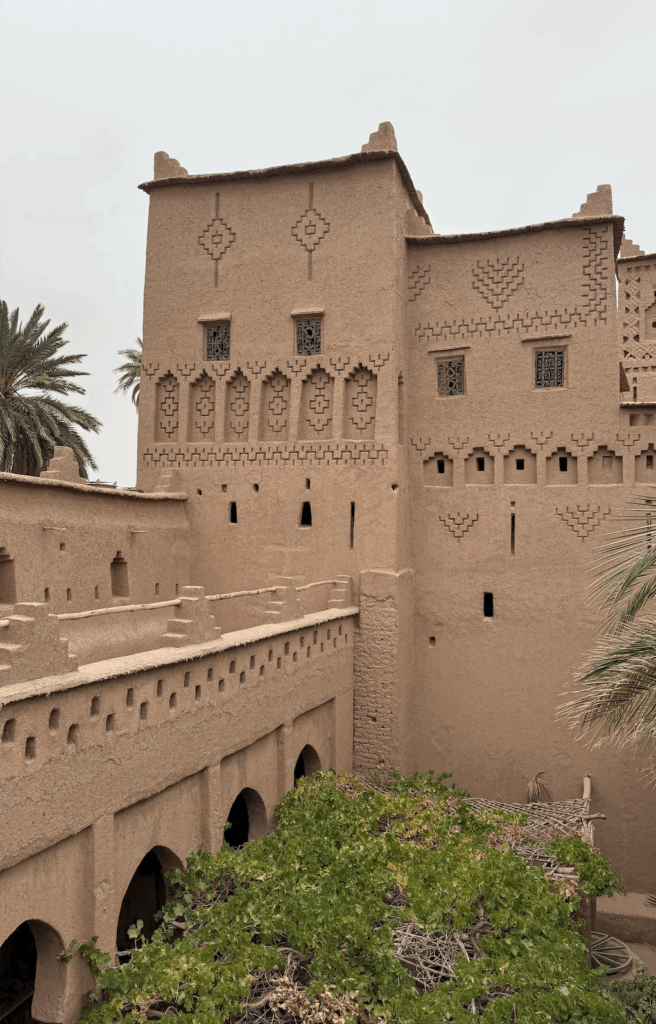
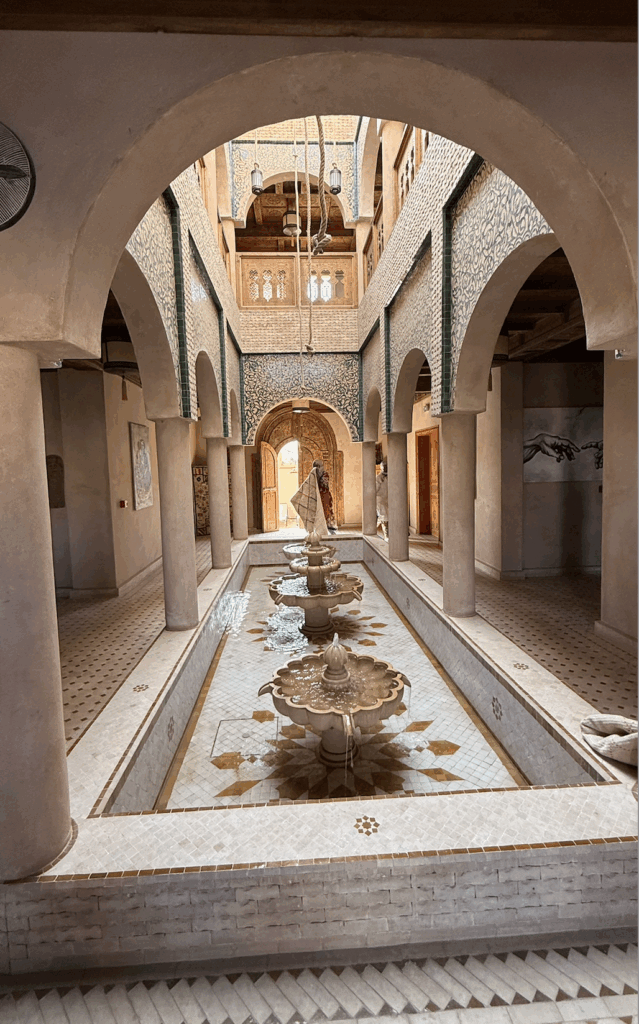
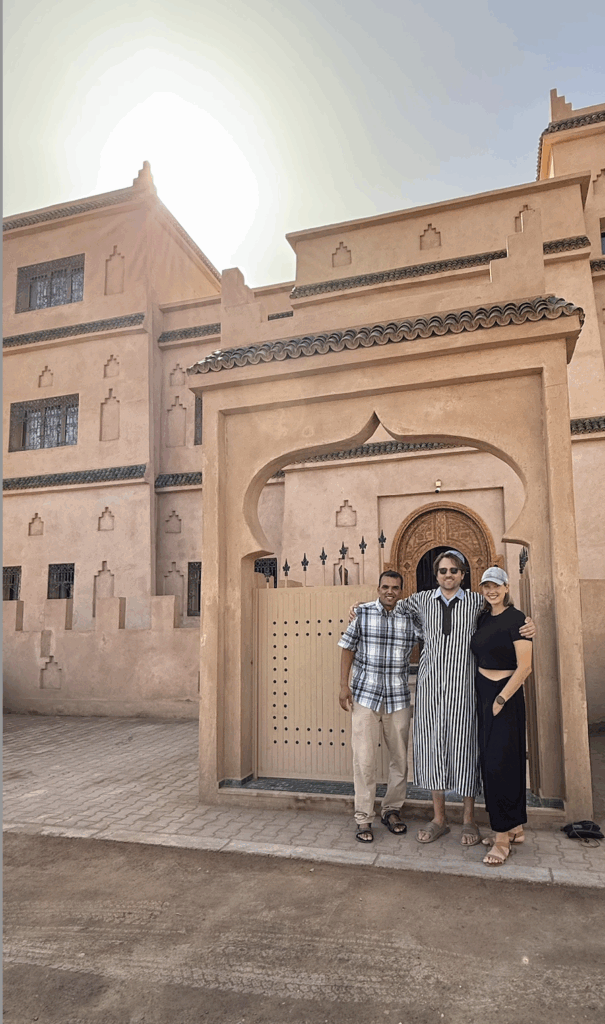
What month is best to visit the Sahara Desert?
We went in September, and our guide recommended the fall (September–November) as the best time to visit for great weather and low crowds. For obvious reasons I’d avoid visiting in the heat of the summer, and in the surprisingly chilly winter months of December, January, and February.
What’s the best private, luxury 6-day Sahara Desert tour?
I did a private luxury 6-day tour with Seekers Travel Morocco. The service was top notch: we traveled in a clean, air-conditioned Land Cruiser, and having a private driver and a knowledgeable, courteous guide made the journey feel effortless—especially as we passed big buses and crowded tour groups rushing through cookie-cutter itineraries.
If you’re thinking about adding something extra, like I did with the fossil excursion, make sure to ask plenty of questions so you know exactly what to expect.
For trip planning, check out Seekers’ sample itineraries on their website. Each tour is fully customizable and can begin or end in cities like Fes, Casablanca, Tangier, or Marrakech, depending on your plans. You can contact them with your questions on WhatsApp at +212 669 081312 or at contact@seekerstravelmorocco.com
How much does a Sahara Desert tour cost?
The cost of a luxury private tour depends on how many days, the number of guests in your party, and the level of luxury that you’re looking for. I recommend reaching out to the tour operator directly with your logistical information to get an accurate quote, but for a tour like mine (2 guests, 6 days, luxury) expect to pay around $1,500–$3,000 per person.
What’s the best hotel in Merzouga?
We stayed in some gorgeous riads and desert camps on our trip, but one that really stood out was Desert Villa Boutique Hotel. This isn’t just a picture-perfect desert hotel, though the pool and fountains are stunning. It’s the product of one man’s obsession.
Youssef, a former Amazigh and the hotel owner, left the nomad life, studied architecture, and built the hotel himself. He’s the reason this place sticks in your memory. As a kid, Youssef and his brother often went hungry, and hotels were the only places that offered them food. He promised himself he’d build a hotel one day, not for money, but to repay that kindness. Every drop of his passion and past are evident in the hotel.
Over dinner with my partner and I, Youssef described the hotel as a “meeting place for cultures” and dared us to ask anything—religion, politics, history. Nothing was off limits. His story made made the desert feel alive in a way that no book or travel blog ever could.
What else can you do on a Sahara Desert tour from Marrakech?
Other than the highlights I’ve already mentioned, we:
- Cooled down at Dades Gorge, where local families were picnicking and relaxing on the river
- Toured Atlas Studios, where movies and television like Gladiator, Game of Thrones, and the Mummy were filmed
- Visited 17th century kasbahs
- Explored fossil and mineral workshops and mines owned by local artisans
- Shopped at local markets
What should I wear in Morocco as a woman? What clothes should I pack for the Sahara specifically?
I saw a surprising amount variety in how both local and visiting women were dressed, and of course what you pack depends on what you’re doing. Regardless, I recommend dressing conservatively and according to local Islamic customs if you don’t want to attract unwanted attention.
As a female adventure traveler, I kept my knees and shoulders covered and wore loose, breathable clothing. I also carried a scarf to cover my arms down to the elbows or my head as needed. If you’re visiting in the end of summer and early fall like I did, it can be tricky to balance respecting local customs with dressing for the extreme heat, so be prepared with:
- Thin flowing pants
- Long, light skirts
- Breathable materials like linen
- Hand-held fans
Looking for another amazing outdoor adventure travel destinations like this 6-day Sahara desert tour from Marrakech?
This blog may contain affiliate links, which means that at no cost to you, I may earn a small commission of any products sold. I only feature products that I believe in and use. Your support means the world to me and allows me to host this website!
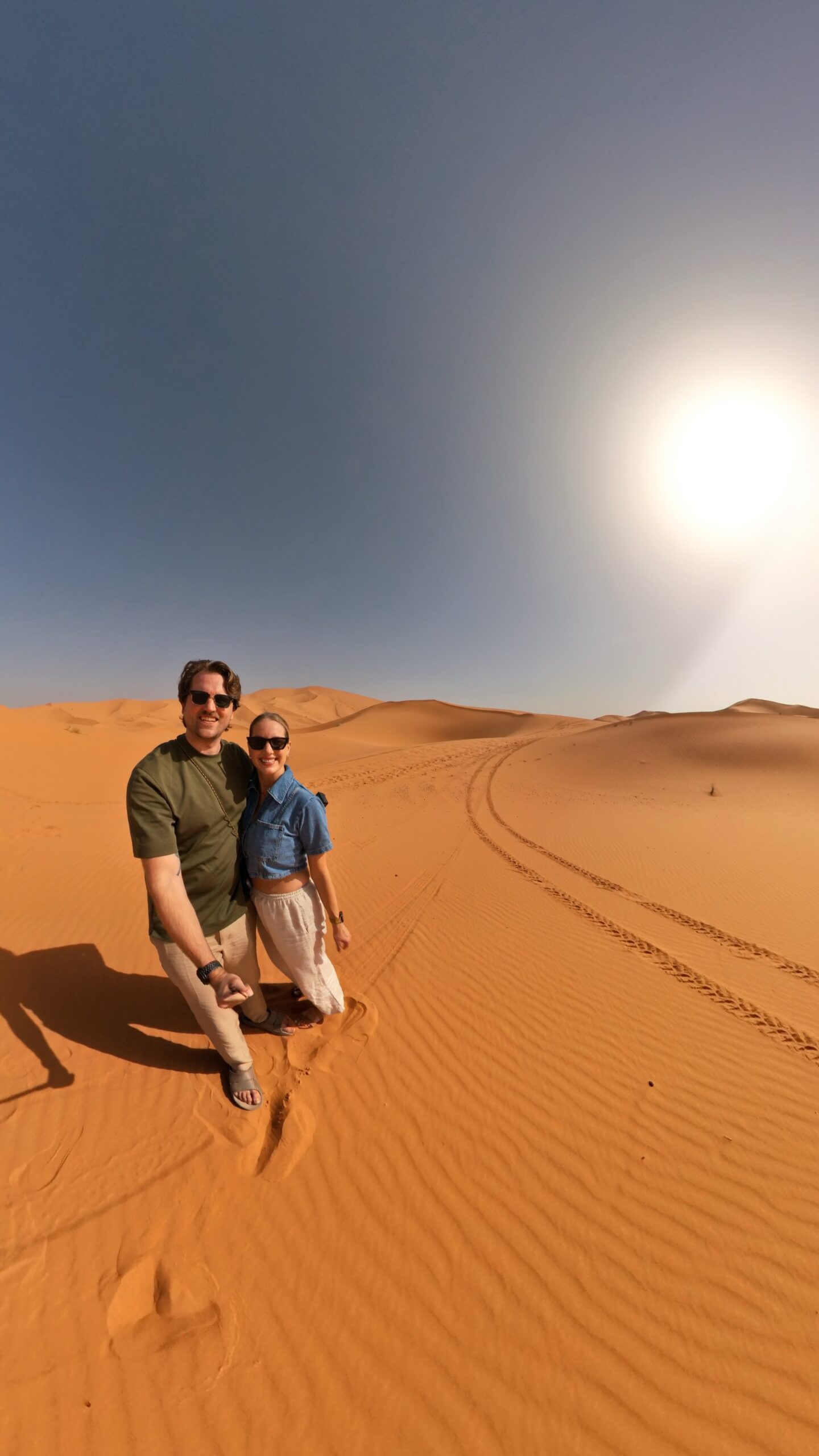
Interesting post, thanks for sharing! Love to see Connor here too haha
Thanks! We had a great time- he wasn’t a fan of the camel though haha.